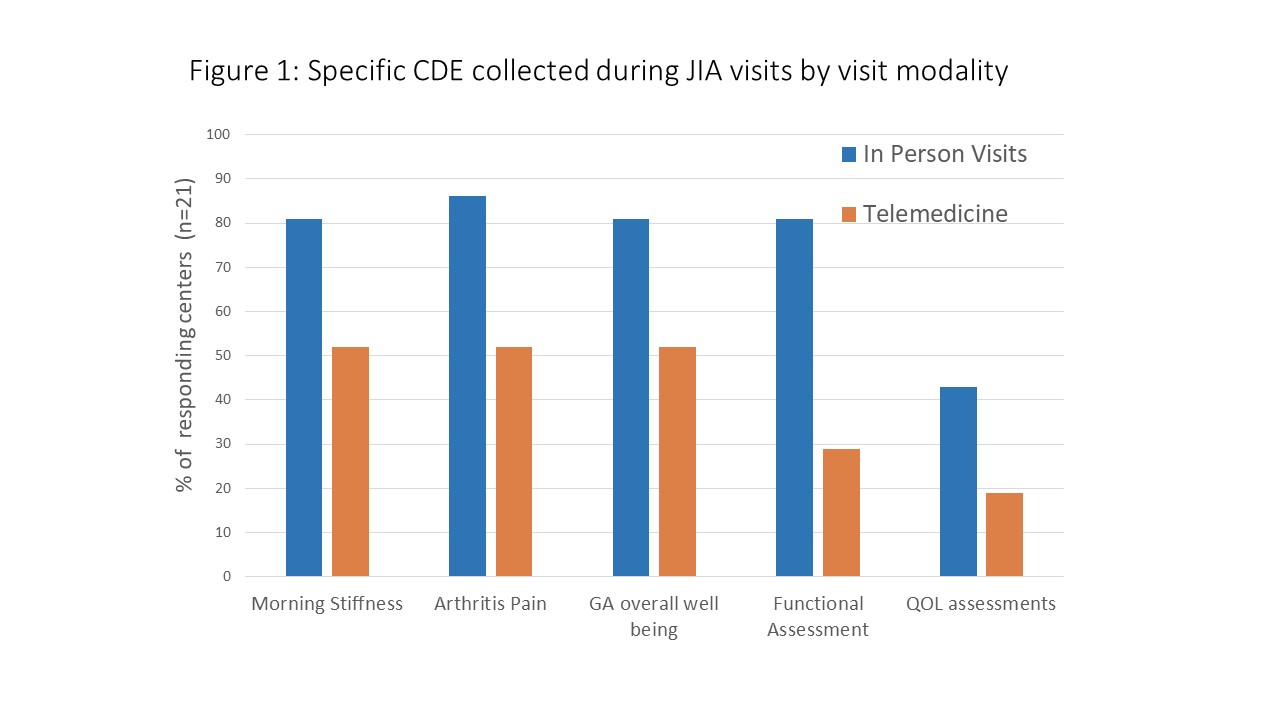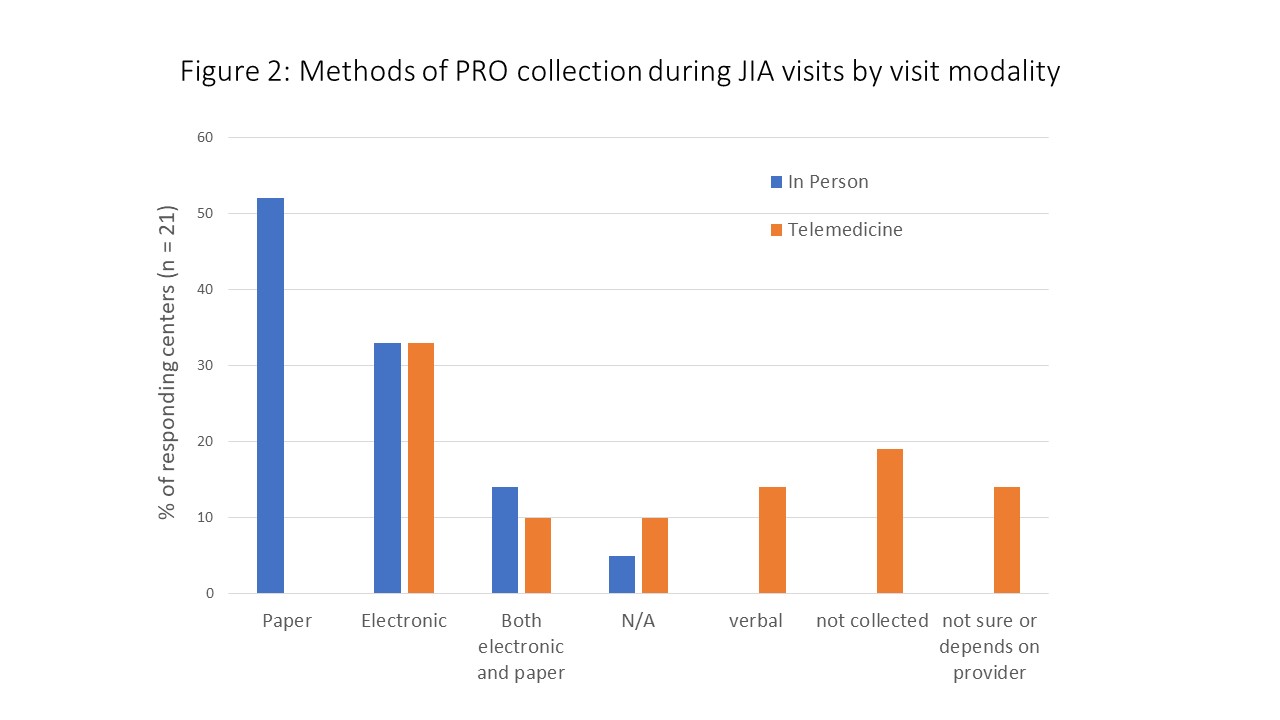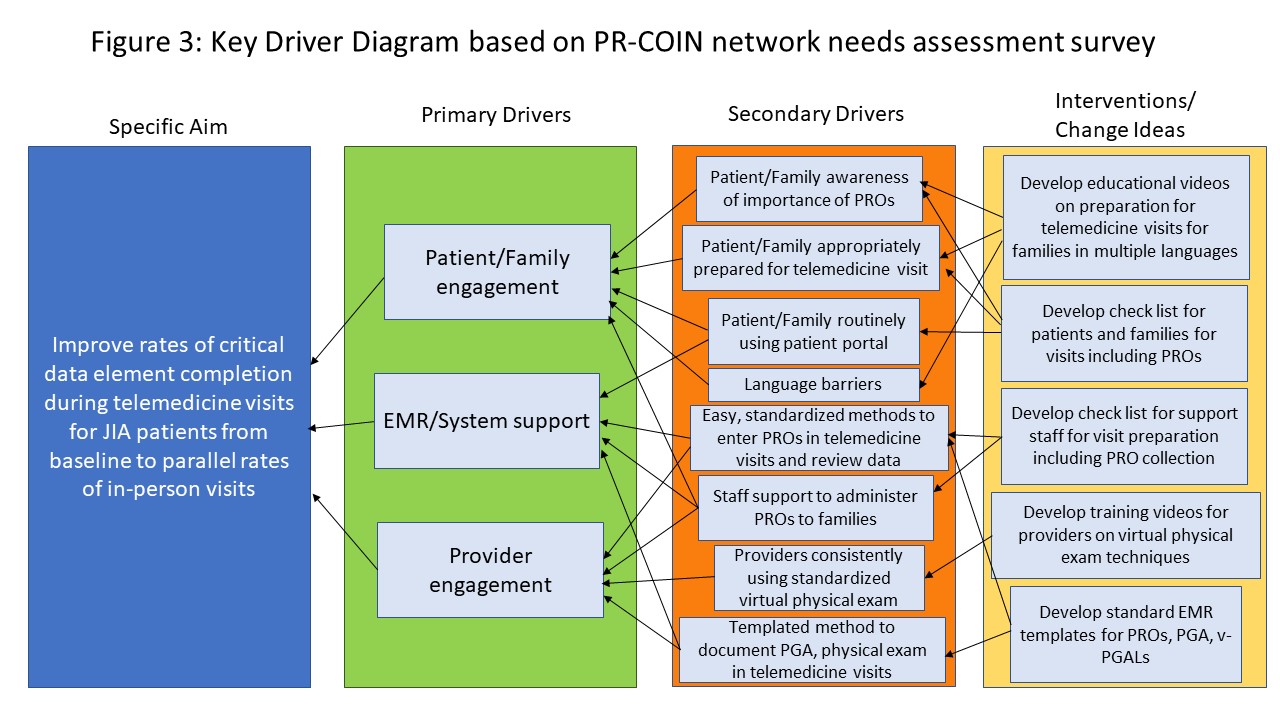Session Information
Session Type: Poster Session A
Session Time: 9:00AM-11:00AM
Background/Purpose: Juvenile Idiopathic Arthritis (JIA) affects 1 in 1,000 children in the United States (US). There is a shortage of pediatric rheumatologists across North America and many patients travel lengthy distances to access subspecialty care. Telemedicine is a potential solution to this distance barrier. Although use of telemedicine has substantially increased since the COVID-19 pandemic, questions remain about the role of virtual visits for monitoring of patients with JIA where hands-on assessments have been the cornerstone for care. Surveys from early in the pandemic indicated that critical data elements (CDE) for Treat-to-Target decision making such as active joint count, physician global assessment (PGA) and patient reported outcomes (PROs) were under-reported in telemedicine relative to in-person visits.1,2 The global aim of this quality improvement effort is to optimize completion of CDE for JIA patients seen via telemedicine, targeting the same rate as in-person visits. To determine primary drivers of CDE in telemedicine visits as well as to inform ideas for change, we performed a needs assessment of post-pandemic telemedicine practices of the Pediatric Rheumatology Care and Outcomes Improvement Network (PR-COIN) network.
Methods: PR-COIN is a multi-center learning collaborative spanning 24 pediatric centers across the US and Canada. A REDCap survey regarding current telemedicine practices was emailed to the faculty representative for each PR-COIN site in January 2023. Quantitative responses were analyzed with descriptive statistics. Qualitative comments were thematically grouped.
Results: Responses were received from 21/24 sites (88%). Figure 1 demarcates CDE collected by visit modality. Figure 2 notes the methods of PRO collection by visit type. Only 2 sites reported that providers use a standard method to assess active joint counts in telemedicine visits. However, most respondents (15/21) indicated that providers used modifications of the ‘video’ pediatric Gait Arms Legs and Spine (vpGALS) tool for virtual joint exams.
Reported barriers to CDE collection during telemedicine visits were grouped into three categories of primary drivers: patient engagement, provider engagement and electronic medical record(EMR)/support staff (Figure 3). Opportunities to improve standard collection of CDE included development of educational materials, easy/automated collection methods, enhanced use of support staff, streamlined questionnaires and standardized templates for virtual physical exams.
Conclusion: Despite three years of telemedicine experience, CDE completion for JIA patients in virtual visits lags behind rates for in-person visits. We are currently developing resources including instructional videos, templates and best practices for providers, patients and EMR/support staff to address these gaps. We plan to implement these interventions at network sites using an iterative quality improvement approach and prospectively track rates of CDE completion.
References
1. Goh YI, et al. Frontiers in Pediatrics. 2021 Mar 4;9:642460.
2. Ryan ME, et al. Pediatr Rheumatol Online J. 2022 Sep 29;20(1):83.
To cite this abstract in AMA style:
Hayward K, Goh Y, Toth M, Leal J, Liu A, Naik N, Singleton J, Youn J, Morgan E. Needs Assessment Survey of Critical Data Element Completion in Telemedicine Visits for Juvenile Idiopathic Arthritis in the Post-Pandemic Period [abstract]. Arthritis Rheumatol. 2023; 75 (suppl 9). https://acrabstracts.org/abstract/needs-assessment-survey-of-critical-data-element-completion-in-telemedicine-visits-for-juvenile-idiopathic-arthritis-in-the-post-pandemic-period/. Accessed .« Back to ACR Convergence 2023
ACR Meeting Abstracts - https://acrabstracts.org/abstract/needs-assessment-survey-of-critical-data-element-completion-in-telemedicine-visits-for-juvenile-idiopathic-arthritis-in-the-post-pandemic-period/



